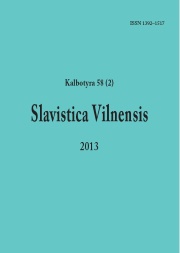Pукописная книга и ее рецепция в Великом княжестве Литовском XIV–середины XVI вв.
The reception of the manuscript book in the Grand Duchy of Lithuania in the 14th– mid-16th centuries
Author(s): Rima CicėnienėSubject(s): Museology & Heritage Studies, Sociolinguistics, Lithuanian Literature, 15th Century, 16th Century, Philology
Published by: Vilniaus Universiteto Leidykla
Keywords: рукописная книга; средневековые кодексы; книжная культура; книга и средневековое общество; Великое княжество Литовское;
Summary/Abstract: The article aims to analyze changes in society’s view of the manuscript book and its reception. The author investigates the ways in which society manifested its reception of the book and how it is reflected in the sources of that time. Manuscript books, archival sources, and objects of art were used as the sources for the research. It has been established that the book satisfied official, social, and personal needs of society and individuals of the time. As books and collections became increasingly numerous and the relationship with books diversified, the idea of the book in the GDL’s society also underwent a significant change. While during the early stage of the period under study a book was understood as a static and uniform sacral object little influenced by an individual, since the 15th century it was considered to be a mobile, mutable object strongly affected by the persons directly connected with the book. Codices migrated both in the geographical and living space. In the early 16th century, the concept of a book as a unit item also underwent a significant change. The concept of a codex as an object that physically joins separate works (books, liber) was replaced by the idea of a codex as an integral unit (a new work) which possesses both internal and external unifying elements of a book.
Journal: Slavistica Vilnensis
- Issue Year: 58/2013
- Issue No: -
- Page Range: 59-78
- Page Count: 20
- Language: Russian

